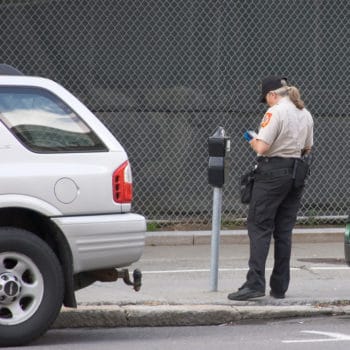Why We Love It
-
$38,230Potential Avg. Salary
-
4.5%Job Growth Rate
-
Growing DemandJob Outlook
-
Dependable Daily WorkloadCareer Attribute
Courtroom clerks are responsible for maintaining court records. They work with a variety of individuals—lawyers, judges, and the public—to gather and distribute necessary information. They create courtroom schedules, distribute schedules to necessary parties, and forward court documents.
Recommended Schools
What is a Courtroom Clerk?
The following job responsibilities are common for individuals in courtroom clerk roles:
- Prepare dockets—schedules—for courtroom sessions
- Inform all required parties—lawyers, judges, and witnesses—of applicable schedules
- Collect, maintain, and distribute courtroom documents to required parties
- Collect fines or other documentation from individuals whose cases are being reviewed or closed
A Day in the Life
Courtroom clerks prepare, maintain, and distribute all documents and records for cases held in the courts they work for. One of their major responsibilities is creating courtroom dockets—the schedules of cases to be held in the courtroom—months in advance. They also alter the docket when necessary and inform all impacted individuals—lawyers, judges, witnesses, plaintiffs, and defendants—of original and revised schedules for courtroom appearances.
In addition to creating and maintaining the docket, courtroom clerks also collect, file, and distribute courtroom documentation. For example, in the case of a closed divorce hearing, the courtroom clerk distributes the results of the hearing to lawyers and the city clerk—the lawyer distributes the files to his/her client(s), and the city clerk updates his/her records pertaining to the marriage.
Courtroom clerks may also assist lawyers and members of the public with questions and transactions. They may answer the phone for the courtroom, collect fees when owed for vehicle citations or court costs, and assist courtroom participants with questions or issues. They work with multiple groups of individuals, so they must be good with people, and they also must be highly organized and attentive to detail to ensure proper record-keeping and record distribution.
Typical Work Schedule
Most courtroom clerk positions are full-time and performed during normal business hours. Courtroom clerks are generally off on weekends and all major holidays.
Typical Employers
Courtroom clerks are employed by the government and may work for district, state, or federal courts.
Recommended Schools
How To Become a Courtroom Clerk
The process of becoming a courtroom clerk depends in part on the state/municipality you work in and the type of court you want to work for. For some positions, a high school diploma or GED may be sufficient for obtaining a job as a courtroom clerk, though professional experience in administrative or legal positions will likely be a prerequisite. A working knowledge of the legal system is beneficial, as well as proficiency in record-keeping, handling money, and performing administrative duties.
In other locations or for positions in higher-level courtrooms, a certificate, associate’s, or bachelor’s degree may be required, and in many cases, graduation from a postsecondary program can be a substitute for required work experience. Certificate or associate’s degree programs in paralegal studies are common for aspiring courtroom clerks, and bachelor’s degrees in criminal justice, business administration, and legal studies offer students the skills they need to succeed as courtroom clerks.
In some locations and courtrooms, clerks are appointed by judges from existing courtroom staff, and in others, courtroom clerks are elected positions. If the court you want to work in operates on an elected or appointed system, experience working in the courtroom in some capacity and networking with leaders is important. This may be possible by working as a paralegal or taking entry-level positions in courthouses and working your way up by proving your talents in the field.
Courtroom Clerk Salary Data
We’ve provided you the following to learn more about this career. The salary and growth data on this page comes from recently published Bureau of Labor Statistics data while the recommendations and editorial content are based on our research.
National Anual Salary
Low Range
$28,680Average
$38,230High Range
$55,290National Hourly Wage
Low Range
$14/hrAverage
$18/hrHigh Range
$27/hrHow do Courtroom Clerk salaries stack up to other jobs across the country? Based on the latest jobs data nationwide, Courtroom Clerk's can make an average annual salary of $38,230, or $18 per hour. This makes it an Above Average Salary. On the lower end, they can make $28,680 or $14 per hour, perhaps when just starting out or based on the state you live in.
Salary Rankings And Facts
#563 Nationally for All Careers
Programs and Degrees
Here are the most common degrees for becoming a Courtroom Clerk. a is usually recommended and specifically a degree or coursework that prepares you for the particular field, see below.
Highest Education Among Courtroom Clerks
- 1.6% Doctorate
- 2.2% Masters
- 19.3% Bachelors
- 13.5% Associates
- 34% College
- 28.4% High School
- 1% Less than High School
Job Growth Projections and Forecast
2014 Total Jobs
140,8002024 Est. Jobs
147,100Job Growth Rate
4.5%Est. New Jobs
6,300How does Courtroom Clerk job growth stack up to other jobs across the country? By 2024, there will be a change of 6,300 jobs for a total of 147,100 people employed in the career nationwide. This is a 4.5% change in growth over the next ten years, giving the career a growth rate nationwide of Below Average.
Growth Rankings And Facts
#462 Nationally for All Careers
What Companies Employ The Most Courtroom Clerks
| Industry | Current Jobs | New Jobs Needed | % Increase |
|---|---|---|---|
| Local government, excluding education and hospitals | 98,400 | 5,600 | 6% |
| State government, excluding education and hospitals | 34,700 | 500 | 1% |
| Self-employed workers | 4,700 | --- | --- |














